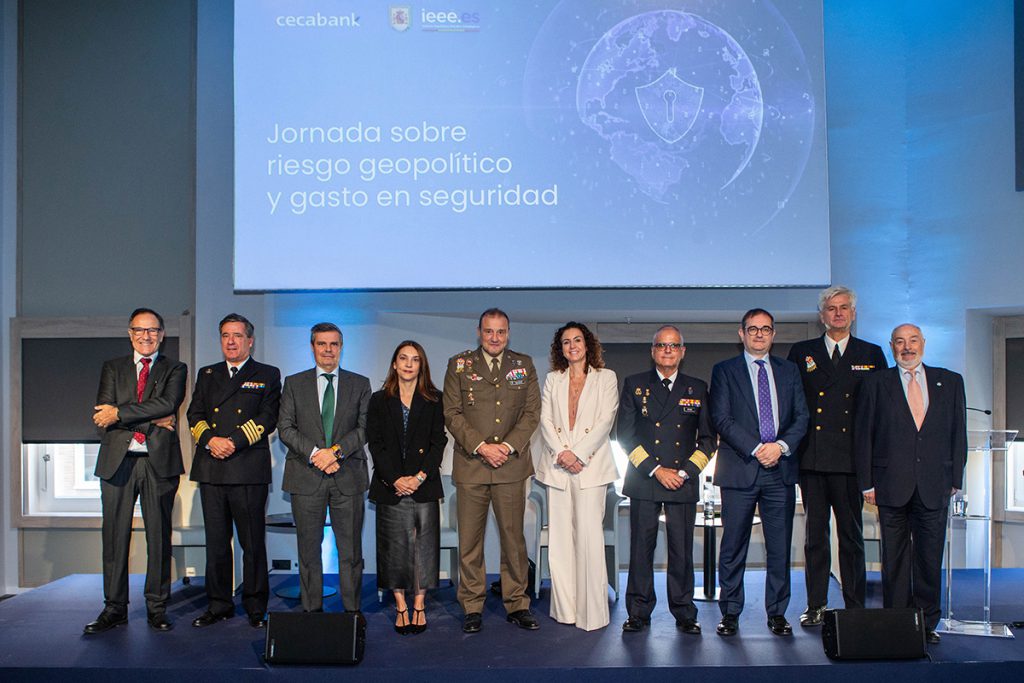
The 'Geopolitical Risk and Security Spending' conference brought together experts from the economic, institutional, academic and military fields to analyse how international tensions are transforming security models, investment decisions and market behaviour
Participants addressed key issues such as the transformation of the international order, the strategic role of technology in national security, the efficiency of defence spending, and the geo-economic factors that influence strategic decision-making, as well as their impact on debt markets
In an international landscape marked by rising tensions, active conflicts, and hybrid threats, geopolitical risk has established itself as a central element in strategic decision-making. Increased security spending—both public and private—reflects the urgent need to protect people, assets, investments, and infrastructure in an increasingly uncertain and fragmented environment.
This reality is driving governments and the business sector to prioritise strategic autonomy in key areas such as defence, cybersecurity, and technology, with direct implications for budgets, industry, and markets. Spending efficiency, adapting to new threats, and the role of technological innovation have become fundamental pillars for ensuring national and economic security in the 21st century.
In this context, Cecabank, a leading wholesale bank in securities, treasury and payment services, and the Spanish Institute for Strategic Studies (IEEE)—part of the Ministry of Defence integrated into CESEDEN—organised the conference 'Geopolitical Risk and Security Spending', held at the Hotel RIU Plaza España in Madrid. The gathering brought together more than 150 professionals from the financial, institutional, academic, and military fields to reflect on current and future challenges in security, defence, technology, and the global economy.
The event was opened by Raquel Cabeza, Corporate Director of Risk and Compliance at Cecabank, and Brigadier General Víctor M. Bados Nieto, Director of the Spanish Institute for Strategic Studies (IEEE). In her opening speech, Raquel Cabeza, Corporate Director of Risk and Compliance at Cecabank, highlighted: 'In an increasingly volatile global environment, it is essential that the financial sector, academia, and policymakers work together to create a multifaceted and comprehensive view of geopolitical risks and anticipate their implications for security and financial stability.'
General Bados then delivered the inaugural lecture entitled 'Key Geopolitical Factors in the 21st Century', in which he analysed the main drivers of transformation in the international order, from the rise of new emerging powers to the impact of regional conflicts, economic tensions, and hybrid threats.
The first roundtable, titled 'Strategic Uncertainties and Factors of Geopolitical Change', was moderated by Luis Soutullo, Corporate Finance Director at Cecabank, and brought together experts with extensive experience in analysing global dynamics: Abel Romero Junquera, ship captain and principal analyst at IEEE, offered a strategic perspective on the role of the sea as a key element in international competition, highlighting its importance in controlling trade routes, resources, and projecting power; Alicia Coronil Jónsson, Chief Economist at Singular Bank, addressed key geoeconomic trends, such as the fragmentation of global trade, the impact of tariffs, and the reconfiguration of supply chains; and Antonio Merino García, Director of Studies and Chief Economist at Repsol, analysed the current challenges in terms of energy and economic security. During the session, the Cecabank's Corporate Finance Director, Luis Soutullo, highlighted that: 'Geopolitical tensions are the main cause of volatility in various financial assets over the last five years and have become a risk factor that must be integrated and assessed in the business models of companies, financial institutions, and, in general, the entire economic sphere.'
The second roundtable, 'How Much Does a Modern Army Cost? 'Improving Security with Efficient Spending' was moderated by Federico Aznar Fernández-Montesinos, frigate captain and principal analyst at IEEE. The debate focused on the need to optimise resources allocated to defence, in the context of growing strategic demands. Sebastián Puig Soler, Captain (Supply Corps) in the Spanish Navy, analysed the budgetary constraints facing defence systems, as well as the operational and strategic challenges that must be considered to ensure effective and sustainable spending. Manuel Vila González, President of the Defence Industry Cluster, went on to highlight the sector's needs in terms of technological innovation, public-private collaboration, and long-term planning.
The third and final roundtable, 'Technology and National Security', was moderated by Raquel Cabeza, Corporate Director of Risk and Compliance at Cecabank. The debate focused on the transformative role of technology in security and defence models, as well as the new risks posed by the digital environment. Gonzalo León Serrano, professor emeritus at the Universidad Politécnica de Madrid, reflected on the impact of technological transformation, highlighting how innovation is redefining operational capabilities and risk management at the national and international levels. For his part, Francisco Javier Roca Rivero, Vice Admiral and Commander of the Joint Cyber Command, addressed the challenges posed by cybersecurity in the current geopolitical environment, emphasising the need for a robust and coordinated national strategy to address digital threats.
The conference was closed by Ainhoa Jáuregui, CEO of Cecabank, who stressed: 'Today we have confirmed that geopolitical risk is no longer an exogenous variable, but a structural factor that influences strategic, budgetary, and investment decisions', to which she added: 'In this scenario, the financial sector has a key role: not only as facilitating of investment, but instead as an agent that it owes understand, anticipate and manage these emerging”risks.
Her remarks capped a day that demonstrated how geopolitical risks have ceased to be the exclusive concern of the political or military spheres, and have become a determining factor in global economic and financial stability. Recent international tensions not only impact markets, but also generate scenarios of growing uncertainty, with direct implications for security, investment, and strategic decision-making. Here and now, understanding and anticipating these risks has become essential for governments, businesses, and institutions seeking to protect their assets and ensure their resilience in an increasingly volatile and fragmented world.
Cecabank, strategic market vision
Cecabank has a strategic vision focused on financial markets, supported by solid technical knowledge, extensive operational experience, and proven analytical capacity. This combination allows us to operate competently and judiciously in the various segments of the financial market.
We continuously monitor domestic and international markets, paying special attention to market sentiment, allowing us to make informed decisions and adapt to a constantly evolving environment.
From the Trading Room, Cecabank operates in the main financial markets, trading a wide range of assets—fixed income, foreign exchange, equities, and derivatives—under strict criteria that guarantee liquidity and solvency.
As a market maker, we participate in Spanish Treasury issues and collaborate with the European Union on the Next Generation EU programme. In addition, is direct member of the main Central Counterparties (Meffrepo, LCH Paris, Eurex) and acts as a market maker in futures in BME, including products as xRolling FX and indexes and companies of the IBEX.
